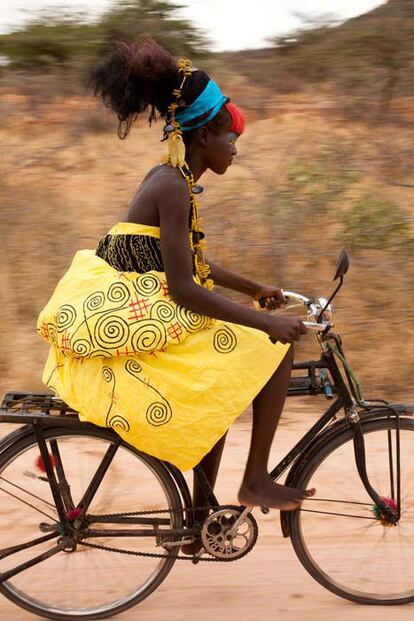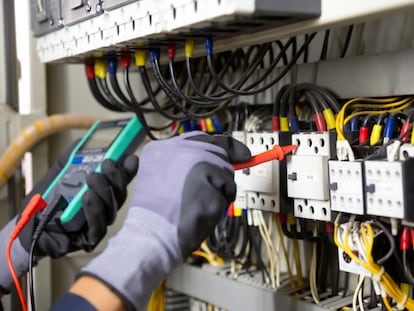Reflections of an ordinary woman: A future made in Africa?

Por Akua Djanie (Ghana)
A las ocho de la mañana de hoy se publicará la versión en castellano.
The African Renaissance. This is New Africa (TINA). Africa Rising. For some, this is very true. Africa is most definitely the place to be. It is a land of opportunity. Everybody is rushing into Africa, to find their bit of El Dorado! You see, unlike Europe, America, Asia, Australia and most parts of the ‘developed’ world, there is still alot to be done in Africa. All the roads and high rises that can be built in Europe and America have been built. Africa is the new place to do up the roads, build huge high-rises, modern looking offices,underground car parks and the likes. Europeans, Asians and Americans are used to going to a park. It is now that parks and fairgrounds are going to be built across Africa.
In fact compared to the ‘developed’ world, we can argue that Africa has nothing. No huge department stores selling expensive designer clothes. No chains and franchisees of burger joints and other fast food outlets. Very few factories producing the daily everyday products. Yet 50 years ago, at Independence, we had the potential to do this. With leaders like Nkrumah and Lumumba across Africa, we not only had the potential but were actually making strides.
Slowly but surely, our new Presidents were going about giving people quality education which they could use to the benefit of their respective countries and Africa as a whole. These new Presidents created projects which would see theircountries having basic amenities like water, lights and good roads. And more importantly, opportunities were created for Africans in African. So in Ghana for example it was Ghanaians that were producing televisions and shoes. Yes, they may not have been top of the range and of a high standard, but with time, practice and experience maybe today, Ghana would be exporting fully functional televisions.
The last 50 years for Africa has been a sad sad tale.
The Continent blessed with the world’s most natural resources has not been able to utilise it to the benefit of its people. The Continent blessed with people of high intelligence and physical strength has not been able to re-educate her people to realise this. Because for many it appears as thou African history begins with slavery. We have forgotten that before slavery Africans were producing everything they needed to survive. All across the land, there were systems in place thathelped the people govern themselves. Africa had tradesmen and blacksmiths. Africa had architects and merchants. Africans knew how to solve issues ranging from crime to family matters without necessarily attending law school. African meteorologists could predict the weather simply by knowing. Indeed, Africans in Africa had a fully functional life and society.
But then came years and years of colonization. And what happened after Independence is a story that continues to break my heart on a daily basis. A people who were once buildingpyramids now find themselves turning to their former enslavers to build for them.
Rather than moving forward, Africa is taking giant leaps backwards. Form good roads at the days of Independence to dusty potholes of today. From trained doctors who actually had a passion for and believed in what they were doing, totoday’s group of frustrated young girls who go into nursing as something to wile away the time whilst they pray for a rich husband! Indeed the African tale does not appear to be a positive one.
Well that is until now. With the new African Renaissance. Now, it all looks like African indeed has a very bright future.
Africa is the new place to make money. And ultimately, that is what everybody is chasing. The El Dorado. The land of gold. The land of plenty. The land where any foreigner can be King. And this is my problem with all those singing about the new bright future for Africa. Certainly it is a brilliant and bright new Africa if you are not African. It is a wonderful new Africa if you are an African in the Diaspora. And it is a very prosperous Africa if you are an educated African in Africa, with contacts to society’s movers and shakers. Because the truth of the matter is, all the new factors that are leading to a new African Renaissance cannot be provided by Africans on the Continent. Or can they? It is not Africans in African who will get the contract to build roads or work on a water project. It is not Africans but the Chinese who are investing in the energy and gas sectors for example. It is not indigenous Africans in Africa who are consulting on oil and gas exploration and deals.
The new African Renaissance is being led and enjoyed by a very few number of people. There is no denying the potential for growth in all spheres of life in Africa. From music to fashion to banking to retail, Africa is fresh territory. And experts are coming in fast and furious. But how many of those experts are indigenous Africans? How does the fact that some of Africa’s capital cities buzzwith a healthy nightlife really translate to a good life for the majority of people? On the one hand, we see one person enjoying a luxury air conditioned vehicle on the same road as we see a hawker selling dog chains. One will clearly agree that indeed Africa is a wonderful place to be. Whilst the order will either be cursing God for the day he / she was born, or praying to that same God for a way out of Africa.
In terms of culture and traditions, I see a (potentially) bleak future for Africa. That is if those of us who are passionate about it do not preserve and pass it on to the next generation. With the globalization (or Americanization as I have always put it) off the world, it seems the youth of Africa are losing their culture and traditions. Today, visit any African country and you will find the youth prefer to speak English (with an American slang!), rather than their own tribal language. Ask these same youth to attend an African dance class and they will tell you no, they now prefer Salsa. These are the same youth who walk around Africa with their jeans hanging low, showing us their boxer shorts. I bet if I challenged some of these youths in Ghana, they would have no clue how to wear acloth the way men traditionally wore it. Look at women across Africa. The majority of them are ashamed to wear their own natural hair. They all follow trends set in London and America. And the current trend says, as an African woman you need to resemble Beyonce or Nicky Minaj! Utterly ridiculous if you ask me.
Today, we are putting aside some of our cultural practices because of modernity. I agree there are some aspects of African culture that need to be abolished, for example female circumcision. But on the whole, most aspects of our culture work in keeping society together. For example, all across Africa, children call people who could be their elder siblings 'Brother' or 'Sister'. So they will address the person as 'Sister Akua'. if the person looks like they copuld be a parent, they are addressed as 'Aunty' or 'Uncle'. This even applies to total strangers. With The New African Renaissance being led by foreigners soon it will become acceptable to call an elder person simply by their first name. How about the rich African culture of dress, food, music, dance etc. All these will be lost if we are not careful. Across Ghana, the youth will eat greasyfried rice any day over local healthy delicacies such as plantain and kontomire stew.
As I write these reflections, I am actually in Ghana. And as wonderful as it is to see the number of roads and buildings being constructed since I last visited in September, it is also alarming because the average Ghanaian is not part of this newmovement. In fact, life for the average Ghanaian is very hard. And this is an indication of how things will progress, not just in Ghana but sadly, across Africa. The rich will certainly only get richer and the poor will really feel the harshness of life.
No doubt Africa has a booming future. But personally I think for the average African in Africa, the next 50 years looks bleak. Current deals that have the potential to create wealth are going to the Chinese, Americans and Europeans. International business franchises are being introduced into Africa by Diasporas or foreigners. The indigenous Africans are not forerunners in the New African
For the privileged few, Africa indeed looks like the placewhere they will find their piece of heaven. Even of there is no electricity, they can buy generators. Even if we all moan about the rising cost of petrol, they will still fill up their luxury vehicles. And there is nothing wrong with that. I strongly believe poverty is a sin against God. Seriously. I do not believe God put any human being on earth to suffer. However, human greed and the unequal distribution of the world’s wealth has lead to the huge disparity between rich and poor. So in as much as some of us are going to enjoy a verybright future in Africa, I think we really need to invest inindigenous and local Africans so that they too are part of the renaissance.
But hey these are just the reflections of an ordinary African woman.
(Publicado en 'New African Magazine' el pasado 5 de agosto)
Tu suscripción se está usando en otro dispositivo
¿Quieres añadir otro usuario a tu suscripción?
Si continúas leyendo en este dispositivo, no se podrá leer en el otro.
FlechaTu suscripción se está usando en otro dispositivo y solo puedes acceder a EL PAÍS desde un dispositivo a la vez.
Si quieres compartir tu cuenta, cambia tu suscripción a la modalidad Premium, así podrás añadir otro usuario. Cada uno accederá con su propia cuenta de email, lo que os permitirá personalizar vuestra experiencia en EL PAÍS.
¿Tienes una suscripción de empresa? Accede aquí para contratar más cuentas.
En el caso de no saber quién está usando tu cuenta, te recomendamos cambiar tu contraseña aquí.
Si decides continuar compartiendo tu cuenta, este mensaje se mostrará en tu dispositivo y en el de la otra persona que está usando tu cuenta de forma indefinida, afectando a tu experiencia de lectura. Puedes consultar aquí los términos y condiciones de la suscripción digital.




























































